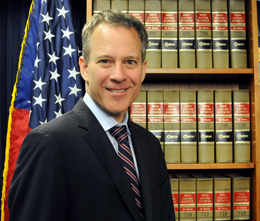 Attorney General Eric T. Schneiderman issued the following statement on the Trump Administration’s notice that it will end its delay of energy efficiency standards for ceiling fans that offer dramatic air pollution reductions, as well as energy- and cost-savings to consumers and businesses. Attorney General Schneiderman, leading an 11-member state and municipal coalition, had sued the Trump Department of Energy (DOE) in April, charging that the Administration’s continued delay of the effective date of the rule violated federal law.
Attorney General Eric T. Schneiderman issued the following statement on the Trump Administration’s notice that it will end its delay of energy efficiency standards for ceiling fans that offer dramatic air pollution reductions, as well as energy- and cost-savings to consumers and businesses. Attorney General Schneiderman, leading an 11-member state and municipal coalition, had sued the Trump Department of Energy (DOE) in April, charging that the Administration’s continued delay of the effective date of the rule violated federal law.
“I’m pleased that after suing the Trump Administration over their efforts to illegally block common-sense energy efficiency standards, they have reversed course and agreed to put them into place. These measures are good for public health, our environment, and the pocketbooks of consumers. I will continue to use the full power of my office to fight back against the Trump Administration’s attempts to rollback progress critical to the safety, health, and prosperity of New Yorkers.”
On January 19, 2017, the DOE published new energy efficiency standards for ceiling fans as a final rule on January 19, 2017, with an effective date for the rule of March 20, 2017.
According to DOE estimates, these standards would combine to eliminate emissions of 132 million tons of the greenhouse gas carbon dioxide, 287 thousand tons of the pollution that creates soot and smog, 530 thousand tons of the potent climate change pollutant methane, and 400 pounds of highly-toxic mercury, over a 30-year period. Over this same period, the Appliance Standard Awareness Project estimates that the efficiency standards would save 200 billion kilowatt-hours of electricity – the equivalent of the annual electricity consumption of 17 million households. The DOE itself estimates that the standards would provide net savings to consumers and businesses of up to $12.1 billion.
Despite the overwhelming environmental and consumer benefits, the Trump Administration delayed the rule’s effective date twice – most recently pushing it back to September 30, 2017 – asserting that stalling the standards was a non-substantive action, and that seeking public input on the delay would be “impractical, unnecessary, and contrary to the public interest.”
On April 3, 2017, Attorney General Schneiderman – joined by the Attorneys General of the states of California, Connecticut, Illinois, Maine, Massachusetts, Oregon, Vermont, and Washington, as well as the Pennsylvania Department of Environmental Protection and the City of New York – filed a lawsuit against DOE, charging that the delays in the effective date of the ceiling fan rule violated both the federal Energy Policy and Conservation Act and the Administrative Procedures Act. The suit was filed in the Second Circuit Court of Appeals.
Yesterday, the DOE published a notice in the Federal Register ending the delay by confirming that the effective date of the energy efficiency standard for ceiling fans will be September 30, 2017.
This matter is being handled by Assistant Attorneys General Timothy Hoffman, Lisa S. Kwong, and Michael J. Myers, and Environmental Scientists Linda M. Wilson and Jennifer Nalbone, of the New York Attorney General’s Environmental Protection Bureau. The Environmental Protection Bureau is led by Lemuel M. Srolovic and is part of the Division of Social Justice, which is led by Executive Deputy Attorney General for Social Justice Alvin Bragg.

